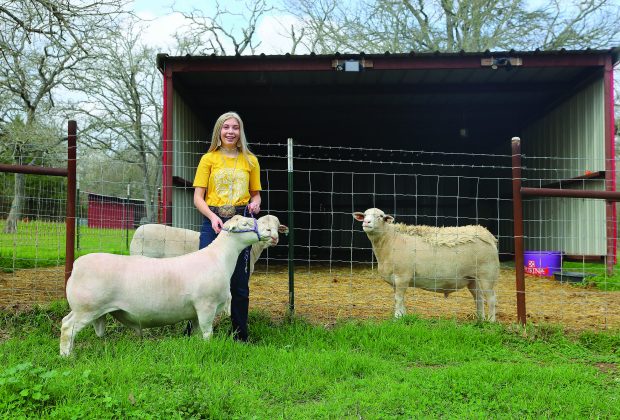Local 4H student preps for livestock show
By Wesley Gardner
LPR Editor
Kiersten Reed knows animals. She knows what it takes to bring them into her home. She knows what it takes to raise them. She knows what it takes show them.
Reed, a 15-year-old sophomore at Lockhart High School, has been raising livestock for most of her life. She’s been a member of 4H since she was in the third grade. She’s an active member of her high school’s Future Farmers of America (FFA) program. She’s raised rabbits, goats and sheep for both market and breeding, and she’s learned a lot from each of those experiences.
Reed, who’s set to compete at the 43rd Annual Caldwell County Livestock Show and Sale next week, initially became a part of the livestock community when she was in the first grade.
“I started with the short-term rabbit project, which is where you have a rabbit for two, three weeks,” said Reed. “It was a lot more than I expected.
“At the time, we were keeping the rabbit inside the house, so it was a lot of cleaning out trays, keeping the pin area clean … It was a lot of learning how to initially take care of an animal.”
Reed said her transition from the short-term rabbit project to becoming a full-fledged 4H member in the third grade was made a little easier by the fact that she would still be showing rabbits, but there was still a lot she needed to learn.
“You go from just showing the one rabbit from your short-term project and only having it for two weeks to having up to six rabbits for a span of a month, a month and a half,” said Reed.
“It was a lot more work.
“Where the short-term project was just giving kids a chance to have the animal, this was actually competing and having to learn about feeding and what actually goes into being able to compete against other people.”
For starters, Reed said, the rabbits need to have a lot a meat on them but can only weigh up to five pounds, so weighing them constantly to determine whether you need to increase or decrease the amount of food they’re being given is a must.
After Reed won the showmanship award during one of her early contests showing rabbits, she was invited to compete at that show’s overall showmanship contest, which sees competitors paired with two random animals so they can display their skills with animals they may or may not know.
“That year, one of the animals was a goat, and my little third-grade self thought goats were the cutest thing,” said Reed with a laugh. “After showing one, I decided I wanted one for a whole year.
“At the time, I was showing someone else’s goat that someone else had trained, someone else had fed, someone else had put the work into. Then, I got my own goat, and I was like, ‘oh no, these things are so stubborn.’ You have them for way longer than you have rabbits.”
Despite their stubbornness, Reed said she was able to take away a lot new knowledge from her time spent raising and showing goats.
“They’re a lot more complicated, because now you don’t just want meat on them, you want muscle, you want fat,” Reed said. “You want the muscle and fat to be balanced, so you have to feed them differently, you have to give them supplements, you have to exercise them.”
But still, Reed said she never really found a way to click with the goats, so after two years, she moved on to raising and showing Dorpers, a South African breed of domestic sheep. She’s been raising market and breeding sheep ever since.
Reed said there were some similarities between raising sheep and goats.
“You still want muscle and you want fat, and you want them to be balanced,” she said. “The thing with Dorpers, though, is they get fat really easily, so it was kind of adapting to that my first year.”
According to Reed, raising and caring for her animals is a full-time job. She starts off each day at 6 in the morning, feeding them and giving them water before heading off to school. When she gets home from school, she walks or runs them, depending on whether they’re market or breeding sheep. After that, she spends time cleaning their pins and taking care of their wool.
When she’s not working with her animals, Reed is also an active member of FFA and 4H, where she participates in wool judging, leadership conferences and assists with other events.
“It’s a lot of time, but I think it’s definitely helped prepare me, not only in the responsibility, time management and organizational aspects of it, but it’s made me find my passion for agriculture.” Reed said, noting she would ultimately like to pursue an agricultural business or agricultural communications degree that she could use to help run some of the larger events around the state.
Ultimately, Reed said she’s enjoyed her time learning agriculture, despite the long hours and time commitment.
“It teaches you a lot,” she said. “You find a purpose and a lifestyle and a whole community within it.
“When you hit rough patches, it’s going to find some way to work itself out. Maybe it won’t be this year. Maybe your winning season will be next year, but you’re going to have your break eventually, and while you’re at it, there are so many more things you can explore through 4H and FFA and agriculture.”




